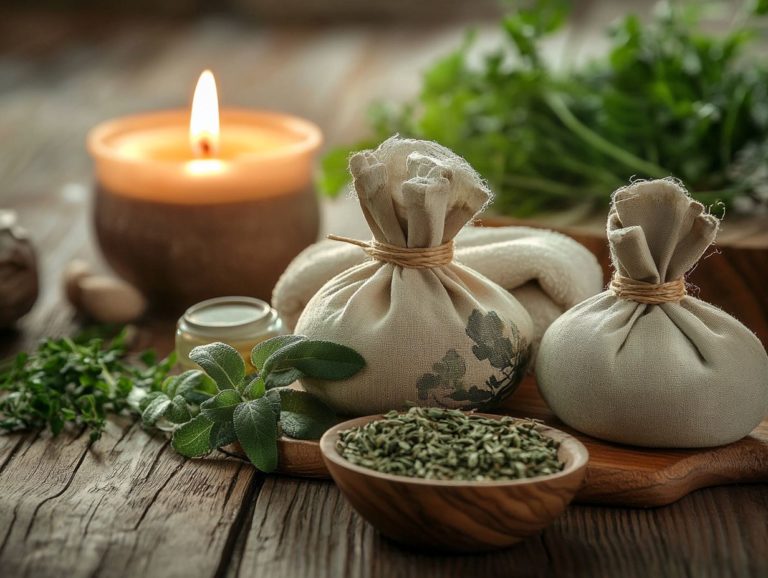Can Herbal Remedies Help with Insomnia?
Struggling with sleepless nights? You re certainly not alone. Insomnia impacts millions, often prompting individuals to seek effective solutions.
This exploration delves into the nature of insomnia, uncovering its various causes and how traditional herbal remedies can pave the way for better sleep. You ll find insights into popular herbs, the scientific research that supports their efficacy, and how they may complement other treatments.
We will also discuss safety precautions and alternative strategies for managing insomnia. Uncover your path to restful nights!
Contents
- Key Takeaways:
- Understanding Insomnia
- Traditional Herbal Remedies for Insomnia
- Scientific Evidence on Herbal Remedies for Insomnia
- Combining Herbal Remedies with Other Treatments
- Precautions and Risks of Using Herbal Remedies
- Alternative Approaches to Managing Insomnia
- Frequently Asked Questions
- Can Herbal Remedies Help with Insomnia?
- What are some herbal remedies that can help with insomnia?
- How do herbal remedies help with insomnia?
- Are there any potential side effects of using herbal remedies for insomnia?
- Can herbal remedies be used along with prescription medications for insomnia?
- How long does it take for herbal remedies to start working for insomnia?
Key Takeaways:

- Herbal remedies have been used for centuries to improve sleep and manage insomnia.
- Some herbs show promising effects on sleep, but more research is needed to confirm their efficacy.
- Consult with a healthcare professional before using herbal remedies for insomnia to avoid potential risks and interactions.
Understanding Insomnia
Understanding insomnia is essential for improving your sleep quality and managing sleep disorders. Insomnia, marked by challenges in falling or staying asleep, can lead to a range of disturbances that impact your daily life.
This condition can arise from multiple factors, including lifestyle changes, stress, and anxiety. Often, it is treated through talk therapy that helps change your thoughts about sleep and various complementary medicine approaches, which are tailored to help you regain control over your sleep and restore balance in your life.
Defining Insomnia and its Causes
Insomnia is characterized by a persistent struggle to either fall asleep or stay asleep, which can disrupt your normal sleep patterns. This can lead to fatigue, irritability, and a noticeable decline in your overall quality of life.
You might encounter various forms of insomnia, such as acute insomnia, which tends to last for a short period, or chronic insomnia, where sleep disturbances occur at least three times a week for three months or longer.
The common culprits often include anxiety, high-stress lifestyles, or even irregular sleep habits, all of which contribute to your inability to enjoy restful slumber. Factors like excessive screen time before bed, caffeine consumption, and irregular sleep schedules can further exacerbate these challenges.
To combat these effects, consider incorporating stress management techniques into your routine. Mindfulness, deep breathing exercises, and maintaining a consistent sleep schedule can significantly enhance your sleep quality and help restore a sense of balance in your life.
Traditional Herbal Remedies for Insomnia
Discover the secrets of traditional herbal remedies that have been beloved for centuries, offering natural solutions to enhance your sleep quality and alleviate those pesky insomnia symptoms.
Renowned herbs like valerian root, chamomile, and passionflower have earned their reputation for their soothing effects, making them potential allies in your quest for restful slumber.
Common Herbs and Their Effects on Sleep
Several herbal remedies have risen to prominence for their effectiveness in promoting better sleep, with valerian root and chamomile leading the charge due to their calming effects.
Valerian root has been the subject of extensive research, revealing its ability to enhance both the onset and quality of sleep by increasing gamma-aminobutyric acid (GABA) levels in the brain. This adjustment helps regulate anxiety and promotes a state of relaxation.
On the other hand, chamomile, often savored as a soothing tea, boasts antioxidants that may facilitate sleep by interacting with specific receptors in the brain, delivering a gentle sedative effect.
In the modern landscape, alternatives like CBD products have gained traction, celebrated for their potential to tackle sleep disturbances without the psychoactive effects typically associated with THC. Users frequently report improved sleep quality and reduced anxiety, making these herbal extracts essential components of contemporary sleep wellness philosophy.
Start exploring these herbal remedies today to reclaim your nights of restful sleep!
Scientific Evidence on Herbal Remedies for Insomnia

The scientific evidence supporting the efficacy of herbal remedies for insomnia is compelling. Numerous studies underscore their potential benefits. Research indicates that herbs like valerian root and chamomile can reduce the time it takes to fall asleep and improve overall sleep quality. This positions them as valuable allies in treating insomnia.
Research and Studies on Efficacy
A range of research studies has explored the effectiveness of herbal remedies for insomnia and enhancing sleep quality. These investigations have used different methods, including randomized controlled trials and observational studies.
Sample sizes have varied, from a few dozen to several hundred participants. For instance, one notable study with 100 participants examined valerian root’s effects and found significant improvements in sleep latency and overall sleep quality compared to a placebo group. Additionally, it’s worth considering whether herbal remedies can replace prescription meds for better sleep solutions.
In another trial, the impact of chamomile extract on insomnia symptoms was assessed in 120 adults, revealing a substantial reduction in nighttime awakenings. Taken together, these findings suggest that certain herbal preparations for better sleep can offer a natural alternative for those seeking relief from sleep disturbances.
Combining Herbal Remedies with Other Treatments
You can enhance the effectiveness of herbal remedies by combining them with other treatments. For example, combining herbal solutions with cognitive behavioral therapy, a type of therapy that helps change thoughts and behaviors related to sleep, and relaxation techniques tackles both the physical and psychological aspects of insomnia.
Potential Synergies and Interactions
Understanding the potential synergies and interactions between herbal remedies and other sleep aids is essential for your safe and effective treatment of insomnia. As you explore various options for relief from sleep disturbances whether herbal supplements, prescription medications, or over-the-counter sleep aids it s vital to be aware of how these treatments might interact.
For example, combining certain herbs with pharmaceutical sleep aids could amplify sedative effects or lead to unwanted side effects, especially if you have existing health conditions.
Prioritize your safety and efficacy by consulting healthcare professionals before starting a regimen that includes multiple substances. This allows for a more holistic approach to managing your sleep issues.
Precautions and Risks of Using Herbal Remedies
While herbal remedies can offer considerable advantages in treating insomnia, you should consider the necessary precautions and potential risks involved. Understanding safety measures, such as dosage guidelines and possible side effects, is crucial to ensure these remedies are used effectively and safely.
Consulting with a Healthcare Professional

Don t skip this step! Consulting with a healthcare professional before starting any herbal remedy for insomnia is crucial for ensuring both safety and effectiveness. These experts guide you through the overwhelming world of herbal treatments.
They provide insights into the safety evaluations of various herbs, considering your personal medical history and any potential interactions with other medications. Healthcare professionals also help determine the appropriate dosages, which can vary based on factors like age, weight, and overall health.
Regular monitoring is important to gauge the remedy’s efficacy and to identify any unforeseen side effects. This approach ensures a balanced and well-informed use of herbal treatments for anxiety relief to tackle insomnia.
Alternative Approaches to Managing Insomnia
Alternative approaches to managing insomnia offer diverse techniques and lifestyle changes that enhance your overall well-being and improve sleep quality. Incorporating methods such as relaxation techniques, targeted exercises for insomnia, and meditation practices can significantly alleviate insomnia symptoms and foster a more restful night s sleep.
Lifestyle Changes and Non-Herbal Remedies
Lifestyle changes and non-herbal remedies are essential for better sleep hygiene. They can significantly enhance your sleep quality.
Setting consistent sleep schedules and maintaining a calming bedtime routine boosts your chances of falling asleep faster. Regular exercise is crucial; it helps regulate your body s natural sleep-wake cycle and lowers stress levels for a restful night.
Create a sleep environment that is dark, quiet, and cool. If you struggle with insomnia, check your surroundings. A distraction-free bedroom fosters a relaxing atmosphere for peaceful slumber.
Frequently Asked Questions
Can Herbal Remedies Help with Insomnia?
Yes, certain herbal remedies can effectively treat insomnia.
What are some herbal remedies that can help with insomnia?

Valerian root, chamomile, lavender, and passionflower are popular options.
How do herbal remedies help with insomnia?
Herbal remedies promote relaxation, reduce stress and anxiety, and improve sleep quality.
Are there any potential side effects of using herbal remedies for insomnia?
While generally safe, some individuals may experience headaches, upset stomach, or dizziness. Always check with a healthcare professional before using herbal remedies.
Can herbal remedies be used along with prescription medications for insomnia?
It s crucial to consult with a healthcare professional before combining herbal remedies with prescription medications, as interactions may occur.
How long does it take for herbal remedies to start working for insomnia?
The effectiveness of herbal remedies can vary, taking anywhere from a few days to weeks to see results. Use them consistently and as directed for the best outcomes.






